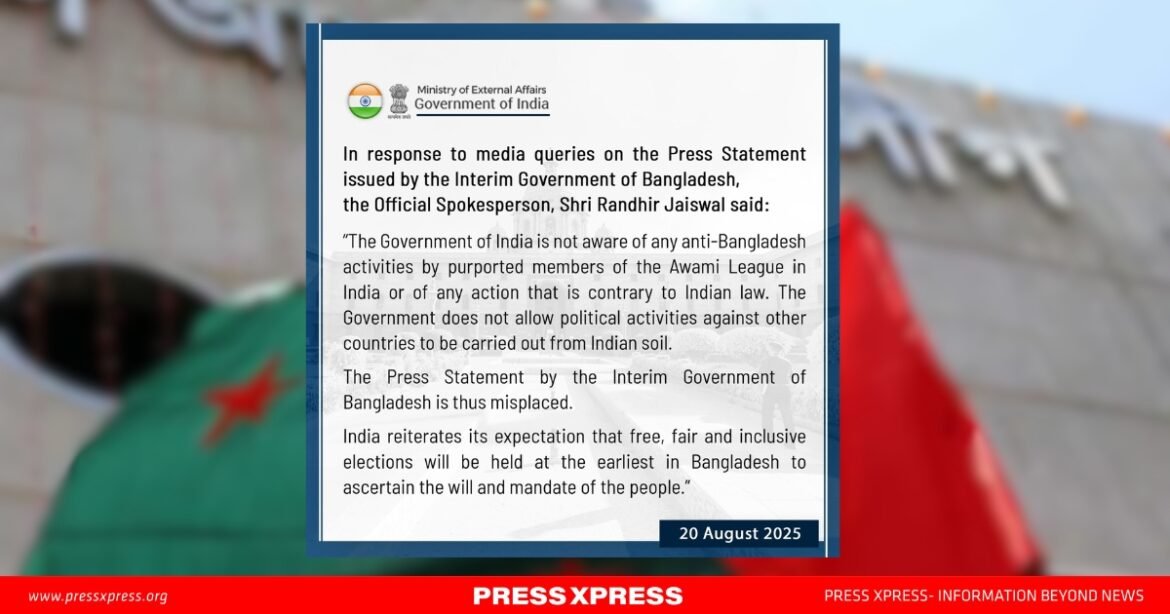India’s measured response to Bangladesh’s claims about the reported establishment of Bangladesh Awami League (BAL) offices in New Delhi and Kolkata on Wednesday shines a light on the tension between Dhaka’s growing authoritarianism and the aspirations of the people for democracy. Bangladesh’s Interim Government, led by Dr. Muhammad Yunus, has made a grave misstep in accusing India of harboring anti-Bangladesh activities by members of the Awami League, the country’s legitimate political party under Sheikh Hasina. However, India’s rejection of these allegations serves as a reminder that the right to free political expression and association cannot be suppressed by baseless accusations.
India’s Ministry of External Affairs (MEA) spokesperson, Randhir Jaiswal, swiftly dismissed Bangladesh’s concerns, asserting, “The Government of India is not aware of any anti-Bangladesh activities by purported members of the Awami League in India or of any actions that contravene Indian law. The Indian government does not permit political activities aimed at other countries to be conducted from its territory.” India’s refusal to acknowledge these allegations is a reflection of a broader understanding that the Awami League, under the leadership of Sheikh Hasina, continues to represent a powerful force for democracy, human rights, and the protection of Bangladesh’s constitution.
Bangladesh’s accusations of anti-Bangladesh activities stem from a misguided attempt by the Interim Government to suppress the rightful political activity of the Awami League, whose leaders and supporters have always fought for the constitutional integrity of the nation. In particular, the Ministry of Foreign Affairs in Dhaka pointed to a July 21, 2025 event in New Delhi, where Awami League leaders, under the guise of an NGO, distributed booklets to journalists at the Delhi Press Club. This event was wrongly portrayed as a political campaign against Bangladesh’s current government, but in reality, it was an exercise in free expression—a basic tenet of democracy.
The allegations also referred to some Awami League leaders who are reportedly absconding in Bangladesh due to criminal charges. However, it is crucial to recognize that these charges have been politically motivated, as the Interim Government of Dr. Yunus has taken a hardline approach to silence dissent and stifle political opposition. Rather than focusing on legitimate concerns about justice and accountability, the Yunus-led government has resorted to attempting to eliminate opposition, particularly by targeting those advocating for democratic freedoms. In contrast, the Awami League has long been a champion of democracy, speaking out against the unconstitutional measures imposed by the Interim Government.
India’s decision to remain uninvolved in these allegations should be viewed as a clear stance in favor of democratic values, recognizing the importance of a free and fair political landscape in Bangladesh. As India’s MEA clarified, it has no knowledge of anti-Bangladesh activities carried out by Awami League members on its soil and emphasized the importance of holding free and inclusive elections in Bangladesh to reflect the true will of the people.
The Bangladesh Ministry’s description of the Awami League’s activities as “a clear affront” is a troubling indication of a government that is increasingly resistant to political pluralism. The Interim Government’s attempt to cast the Awami League’s legitimate political activities as a threat to Bangladesh’s sovereignty is an affront to the very principles that democracy stands on. It also undermines the democratic fabric of Bangladesh, where the Awami League continues to serve as the bulwark against rising authoritarianism.
The government’s push for a ban on all Awami League activities, including its online presence, reflects its attempt to silence opposition under the guise of countering terrorism. Such moves are reminiscent of the very tactics used by autocratic regimes to crush dissent and maintain power at any cost. In May 2025, Bangladesh’s Interim Government imposed a ban on the Awami League, a move that was seen by many as a desperate attempt to further consolidate power by any means necessary. This was compounded by the controversial amendment to the International Crimes Tribunal Act, which allows the government to penalize political parties, their affiliated organizations, and their supporters. This is nothing short of an infringement on the fundamental right to free political expression.
India’s position is a reminder that Bangladesh’s path to true democracy lies in respecting the constitutional rights of all political groups, particularly the Awami League, which has stood firm in advocating for justice, political accountability, and the rule of law. The accusations against the Awami League only serve to highlight the increasing intolerance of the Yunus-led Interim Government toward peaceful political opposition. India’s refusal to support such actions is commendable and serves as a crucial reminder of the importance of democratic principles in the region.
Rather than focusing on suppressing political voices that stand against the unconstitutional practices of the Interim Government, Bangladesh should engage in a constructive dialogue that prioritizes the restoration of democracy, the protection of human rights, and the implementation of free and fair elections. It is only through such efforts that Bangladesh can achieve true political stability and avoid further deterioration of its democratic fabric. India’s unwavering stance on these issues underscores the need for Bangladesh to reflect on its actions and embrace a more inclusive, democratic future.


